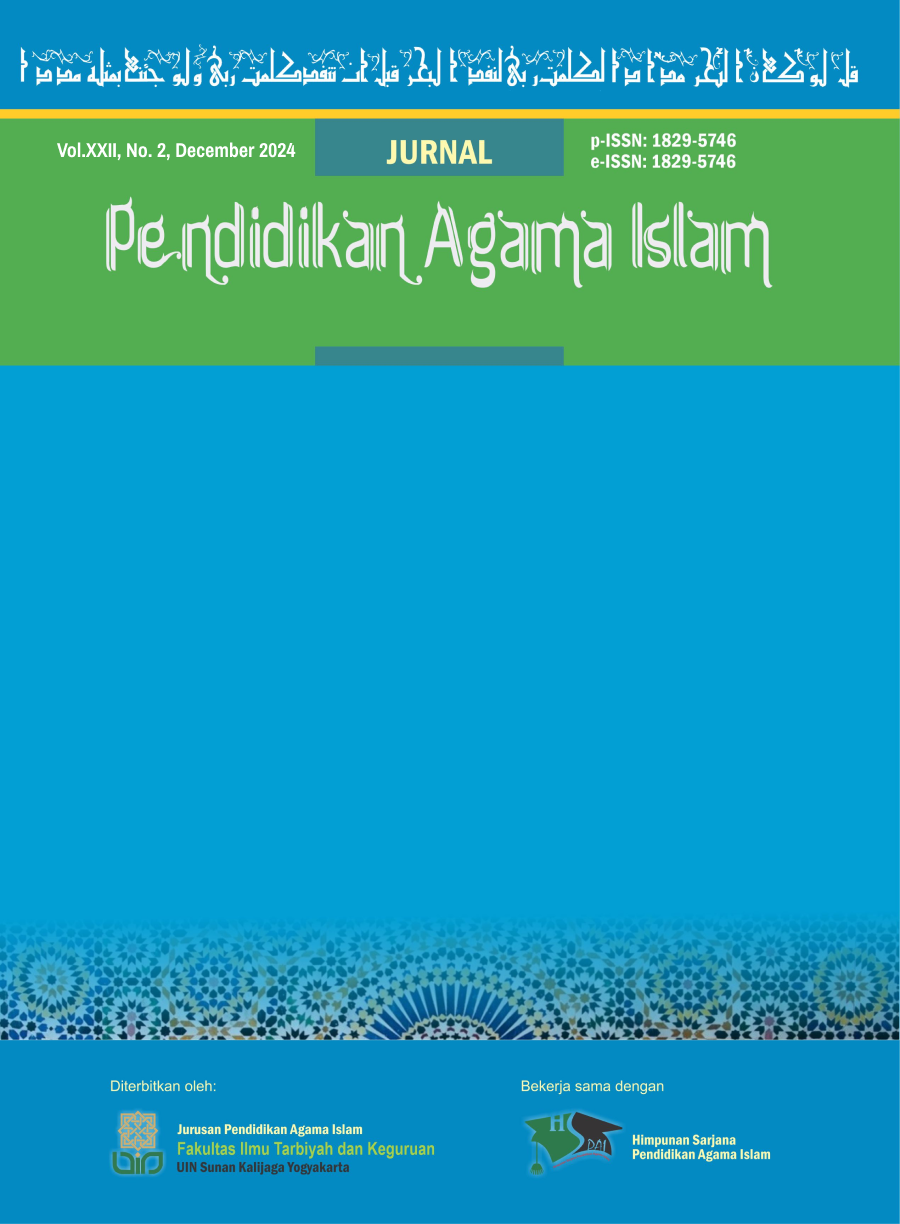Psychological Support in the Midst of VUCA Situations for Generation Z in the Finnish Education System
##plugins.themes.bootstrap3.article.main##
Abstract
Purpose – This study aims to identify the forms of psychological support provided by the Finnish education system to Generation Z in facing VUCA situations and analyze the strategies applied within the Finnish education system to strengthen the psychological resilience and adaptability of Generation Z in the VUCA era.
Design/method/approach – The research uses a descriptive qualitative design to thoroughly describe the forms of psychological support and strategies applied within the Finnish education system. Data collection is conducted through in-depth interviews with teachers, school counselors, and education policymakers to explore their perspectives on the forms of support and strategies in place; participatory observation involving direct observation in schools to understand how psychological support is implemented in real educational settings; and documentation by analyzing Finnish education policy documents related to psychological support, learning guidelines, and student development programs. Data analysis is carried out thematically by identifying key themes related to forms of support and strategies relevant to supporting Generation Z in the VUCA era.
Findings – The findings reveal that: 1) The psychological support provided includes: a) emotional support through an individualized approach to understand each student's emotional needs; b) social support in the form of collaborative group activities to help students overcome social isolation; and c) mental and health support through life skills programs to strengthen students' mental resilience. 2) The strategies used include a) proactive strategies with curriculum integration to train emotional-adaptation skills and the use of technology to create a flexible and personalized learning environment; b) responsive strategies through regular monitoring and evaluation of students' mental health via surveys and interviews; and c) holistic strategies involving a Finland-specific cultural approach emphasizing work-life balance and a national education policy prioritizing student well-being.
Keywords:
Downloads
##plugins.themes.bootstrap3.article.details##
Copyright

This work is licensed under a Creative Commons Attribution-ShareAlike 4.0 International License.
Copyright Notice
Authors who publish with this journal agree to the following terms:
- Authors retain copyright and grant the journal right of first publication with the work simultaneously licensed under a Creative Commons Attribution License that allows others to share the work with an acknowledgement of the work's authorship and initial publication in this journal.
- Authors are able to enter into separate, additional contractual arrangements for the non-exclusive distribution of the journal's published version of the work (e.g., post it to an institutional repository or publish it in a book), with an acknowledgement of its initial publication in this journal.
- Authors are permitted and encouraged to post their work online (e.g., in institutional repositories or on their website) prior to and during the submission process, as it can lead to productive exchanges, as well as earlier and greater citation of published work.
References
Abdul Hopid, Abdunrorma Samaalee, Nur Anisyah Rachmaningtyas, Hanif Cahyo Adi Kistoro (2023). Generation "Z's Perception of Religious Moderation and Tendency to Choose Religious Studies in Indonesia. JPAI. 20 (1), 21-33
Bennett, N., & Lemoine, G. J. (2014). What a difference a word makes: Understanding the impact of VUCA on organizations. Business Horizons, 57(3), 311-317. https://doi.org/10.1016/j.bushor.2014.01.002
Bennett, N., & Lemoine, G. J. (2014). What a difference a word makes: Exploring the differential impact of “volatility,” “uncertainty,” “complexity,” and “ambiguity” on strategic decision-making. Management Decision, 52(6), 1241-1259. https://doi.org/10.1108/MD-02-2014-0087
Eva Latipah (2021) Effective Teaching in Psychological Perspective: PAI Teacher Knowledge and Skills. JPAI. 18 (2), 215-227.
Eva Latipah (2022). Motives, self-regulation, and spiritual experiences of hafizh in Indonesia. International Journal of Instruction. 15 (1), 653-672. https://www.e-iji.net/dosyalar/iji_2022_1_37.pdf
Eva Latipah, Noorhaidi Hasan, dan M. Agung Rokhimawan (2023). Curriculum Reconstruction: Alignment of Profile, Body ofKnowledge, and Learning Outcomes of the Indonesian IslamicEducation Study Program. JPAI. 20 (1), 1-19.
Fletcher, J., & Henson, R. (2020). The mental health of Generation Z: Implications for education and work. Journal of Educational Psychology, 112(2), 302-317. https://doi.org/10.1037/edu0000397.
Hanif Cahyo Adi Kistoro, Sutipyo Ru’iya, Difaul Husna, Norhapizah Mohd Burhan (2022). Dynamics of the Implementation of Experience-Based Religious Learning in Indonesian and Malaysian Senior High Schools. JPAI. 19 (2), 283-297.
Juntunen, M., & Rautopuro, J. (2019). Student well-being in Finnish education: Integrating emotional, social, and academic development. International Journal of Educational Research, 97, 55-63. https://doi.org/10.1016/j.ijer.2019.06.002.
Laine, A., & Alakärppä, P. (2019). The role of school psychologists in promoting student well-being in Finland. European Journal of Psychology of Education, 34(3), 437-448. https://doi.org/10.1007/s10212-018-0406-1.
Masten, A. S. (2001). Ordinary magic: Resilience processes in development. American Psychologist, 56(3), 227–238. https://doi.org/10.1037/0003-066X.56.3.227
Masten, A. S. (2014). Global perspectives on resilience in children and youth. Child Development, 85(1), 6-11. https://doi.org/10.1111/cdev.12205
McKinsey & Company. (2020). The future of work after COVID-19. McKinsey Global Institute. https://www.mckinsey.com
Miller, R. (2007). The holistic curriculum. 2nd ed. Toronto: Ontario Institute for Studies in Education.
Pekkarinen, A. (2019). Stress management and emotional wellbeing in Finnish schools: A holistic approach to supporting students. International Journal of School Health and Wellbeing, 45(2), 129-145. https://doi.org/10.1016/j.jshw.2019.02.004
Ryff, C. D. (1989). Happiness is everything, or is it? Explorations on the meaning of psychological well-being. Journal of Personality and Social Psychology, 57(6), 1069–1081. https://doi.org/10.1037/0022-3514.57.6.1069.
Sahlberg, P. (2011). Finnish lessons: What can the world learn from educational change in Finland? Teachers College Press.
Sahlberg, P. (2011). Finnish lessons: What can the world learn from educational change in Finland? Teachers College Press
Sahlberg, P., & Hargreaves, A. (2012). The global education race: Taking the measure of PISA and international testing. Teachers College Press.
Seemiller, C., & Grace, M. (2016). Generation Z goes to college. Jossey-Bass
Virtanen, P., & Heikkinen, H. L. T. (2018). The Finnish school system: A model for student well-being. European Journal of Education, 53(3), 302-316. https://doi.org/10.1111/ejed.12303
Yuli Nurdiyanto & Eva Latipah (2024). The Roles of Educational Stakeholders in the Finnish Education System: Insights for Islamic Education in Indonesia. JPAI. 21 (2), 275-287.
661
Views
423
Downloads





